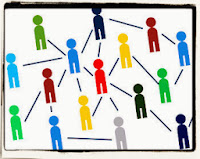Why Payforward Networking is More Effective Than 'Tit for Tat'
One of the cornerstones of relationship networking is the concept of helping the people in your network with no expectation of a direct return. To people unfamiliar with this approach this can seem odd. Many times in workshops people have asked me if this proactive aid isn't just a way to force someone to do something for you by creating an obligation to reciprocate. But it isn't and the reason why this "payforward" mentality works is very interesting.
More about professional networking
There's much more about professional networking in my book Payforward Networking on the Amazon Kindle bookstore. There will also be a paperback edition soon. This book is based on my experience delivering lectures, seminars and one-day workshops about networking for companies, organizations and business schools.
If you are in a position to help someone you should do so anyway, and not wait until they can help you. Helping someone so that they help you, the 'tit for tat' approach both makes people feel uncomfortable and at the same time it is not the most productive way. It is much more effective and satisfying to simply reach out to help people in your network when you can without even thinking what they could do for you. This payforward approach does not give you an immediate return, though it does strengthen your relationship, but if you contribute to the group others are encouraged to do the same and eventually you benefit. So you help A, A helps B, B helps C and perhaps C helps you.
This is much more effective for the same reason that we have money. You could conceivably create a barter economy where a writer needing a plumber has to look for a plumber who needs a writer, which seems rather unlikely. It is much simpler to use money because it means that you are not limited to working with people who need you.
In much the same way payforward networking effectively introduces the idea of a networking currency, credits that you build up in a virtual bank that eventually you cash in when you receive help from another person. It can happen that you could help someone who could help you directly, but it is much more likely that you help someone, they help another and one of the people who benefited from this helps you one day.
To apply this technique you need to know what everyone in your network is looking for, so you will be able to watch out for these things so that you can connect people with people and people with opportunities. You will also need to keep opportunities in your network. If you hear about a job opening in Paris and you don't want it don't just say no thank you; share the opportunity with your network. If someone in your network succeeds then the network benefits and ultimately you do, too.
More about professional networking
There's much more about professional networking in my book Payforward Networking on the Amazon Kindle bookstore. There will also be a paperback edition soon. This book is based on my experience delivering lectures, seminars and one-day workshops about networking for companies, organizations and business schools.
Lectures, Workshops, Coaching; Writing
For lectures, workshops, coaching and writing on networking, influencing and other communication topics visit http://andrewhennigan.com, email conseil@andrewhennigan.com or call 0033 6 79 61 42 81 in France and 0046 730 894 475 in Sweden.
For lectures, workshops, coaching and writing on networking, influencing and other communication topics visit http://andrewhennigan.com, email conseil@andrewhennigan.com or call 0033 6 79 61 42 81 in France and 0046 730 894 475 in Sweden.
Related Posts About Networking
Three ways to be more confident at networking events
Why being a connector makes your networking more effective.
Why you should be networking even if you are not looking for a job
How Encouraging Networking Makes Your Workplace More Effective
How to Make Photos for Professional Profiles and CVs
Why Networking is About Building relationships
How to Use Twitter for Professional Networking
LinkedIn: Why Unanswered Messages are Wasted Opportunities
LinkedIn May Be Hacker's Dream Tool But Attacks Easy to Foil
Recruiters Not Only Check Social Media They Use Them to Identify People
How to Separate Work and Private Networking
Linkedin Etiquette: How to Approach People You Don't Know
Professional Networking: Five Sites You Should Be Using for Your Career
Three Keys to Networking
Selling Your Ideas: Influencing Your Way to Success
Three ways to be more confident at networking events
Why being a connector makes your networking more effective.
Why you should be networking even if you are not looking for a job
How Encouraging Networking Makes Your Workplace More Effective
How to Make Photos for Professional Profiles and CVs
Why Networking is About Building relationships
How to Use Twitter for Professional Networking
LinkedIn: Why Unanswered Messages are Wasted Opportunities
LinkedIn May Be Hacker's Dream Tool But Attacks Easy to Foil
Recruiters Not Only Check Social Media They Use Them to Identify People
How to Separate Work and Private Networking
Linkedin Etiquette: How to Approach People You Don't Know
Professional Networking: Five Sites You Should Be Using for Your Career
Three Keys to Networking
Selling Your Ideas: Influencing Your Way to Success




Comments